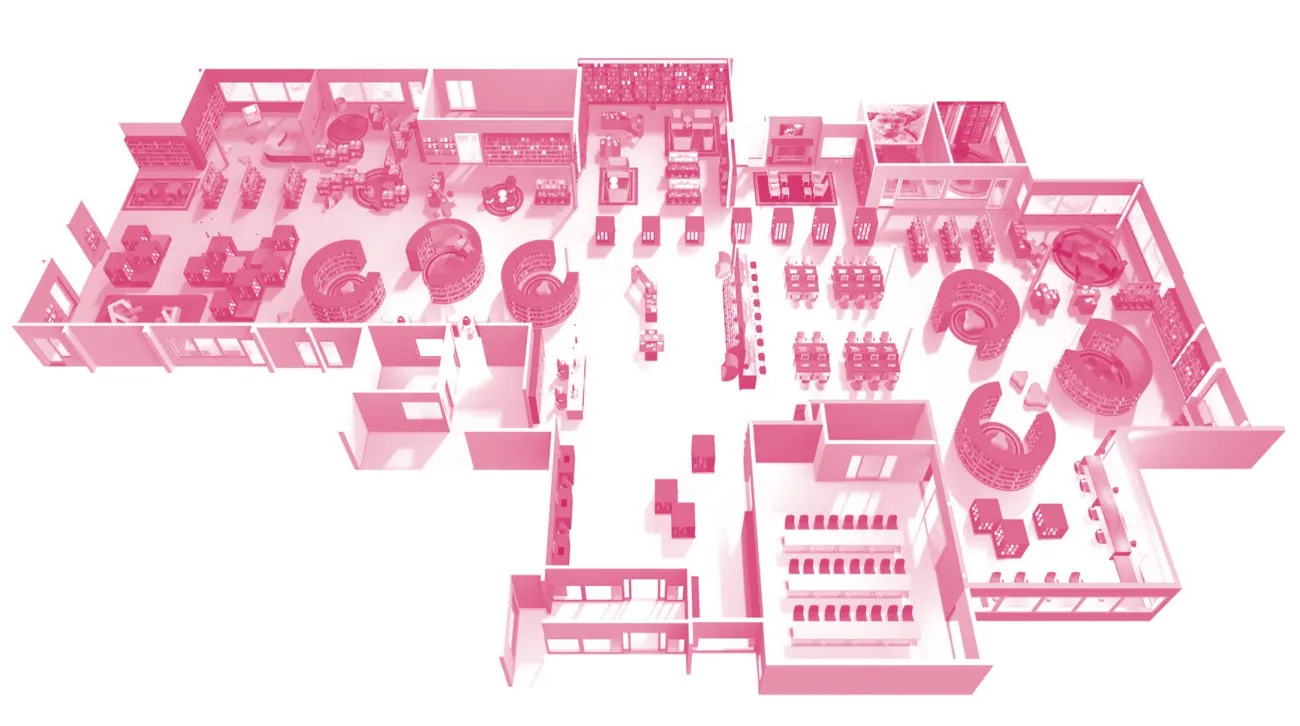Where Are the Books?
2017-09-08ByMichaelRosenwald
By Michael S. Rosenwald
Where Are the Books?
By Michael S. Rosenwald
The hallmark of public libraries—the printed book, bound by covers and centuries of page-turning—is being shoved aside by digital doppelgangers.
[2] Around the country, libraries are slashing their print collections in favor of e-books, prompting battles between library systems and print purists1print purist指坚持主张以纸张为媒介、用油墨印刷出版传统图书的人。, including not only the prepixel generation but digital natives who represent a sizable portion of the 1.5 billion library visits a year and prefer print for serious reading.
[3] Some of the clashes have been heated. In New York, protesters outside the city’s main branch have shouted:“Save the stacks! Save the stacks!” In Northern Virginia, the Fairfax County library system chief mused that the Friends of the Library were no longer friends—a feud fueled by outrage over a print collection that has shrunk by more than 300,000 books since 2009.The drop in the District is even more dramatic: Nearly 1 million books have vanished since 2009.
公共图书馆的标志——离不开封面包裹、千百年来一页页翻阅的纸质书——正被电子书幽灵推到一边。
[2]在美国各地,图书馆因对电子书青睐有加而削减纸质书的收藏,此举加剧了图书馆和纸质书纯粹主义者的对抗。这些纸质书纯粹主义者中,不仅有出生于像素时代前的人,也有出生于数字时代的。他们占了图书馆每年15亿次访问总量中的很大一部分,都更喜欢在严肃阅读时使用纸质书。
[3]一些冲突已经愈演愈烈。在纽约,抗议者就在图书馆主要分馆前大叫:“拯救书架!拯救书架!”在北弗吉尼亚,费尔法克斯县图书馆负责人说,图书馆之友不再友好了——2009年以来,印刷版藏书减少了30多万册,这一情况引起的公愤加剧了原本就有的不和。哥伦比亚特区纸质书的下降更加明显:2009年以来,消失了将近100万册。
“To say Gutenberg2谷登堡,德国活版印刷发明人。此处代指传统印刷出版的纸质书。’s days are over is a terrible mistake,” said Dennis Hays, a former U.S. ambassador and chairman of Fairfax Library Advocates, a group of residents at war with library officials.“Nothing can take the place of a book.”
[4] Librarians are feeling the heat.
“We’re caught between two worlds,”said Darrell Batson, director of the Frederick County Public Libraries system in Maryland, where the print collection has fallen 20 percent since 2009. “But libraries have to evolve or die. We’re probably the classic example of Darwinism.”
[5] The evolution of information flow has forced their hands, librarians say. Just as books advanced from slabs of parchment to paperbacks, they are transforming again, from paper to pixels3pixel像素。此处代指以数字化形式出版的电子书。. With Plato only a download away, libraries have lost their monopoly on knowledge.
[6] In evolving, librarians are steering tight acquisition budgets to e-books, which are more expensive than print because, among other reasons, publishers fear large databases of free e-books will hurt their business. E-book spending has grown from 1 percent of library budgets to 7 percent, according to a Library Journal survey. One library in San Antonio went much further, opening a bookless, all-digital branch called BiblioTech.
“说什么纸质书的时代结束了,简直荒谬透顶。”美国前大使、费尔法克斯图书馆拥趸协会主席丹尼斯·海斯说,“没有任何东西能替代书籍。”该协会由当地居民组成,与图书馆系统的官员争吵不休。
[4]图书馆工作人员感受到论争的白热化。
“我们夹在两个世界之间。”马里兰州弗雷德里克县公共图书馆总监达内尔·巴特森说,“但是图书馆不进步便消亡。很可能我们就是达尔文进化论的范例。”马里兰公共图书馆的藏书自2009年以来已经下降了20%。
[5]图书馆工作人员说,信息流动方式的演进逼迫他们改变。正如厚厚一沓的羊皮书发展为纸面平装书,图书如今再次改进,从纸变身像素。读者和柏拉图之间不过是一次下载的距离,图书馆因此丧失了对知识的垄断地位。
[6]在图书馆演进过程中,工作人员严格控制电子书的购买预算。电子书比纸质书贵得多,其中一个原因就是出版商害怕庞大的免费电子书数据库会让他们亏损。根据《图书期刊》的一项调查,购买电子书的费用已经从图书馆预算的1%上升到7%。圣安东尼奥的一家图书馆在革新之路上走得更远,它开设了名为“文献技术”的全数字化无纸分馆。
[7] Meanwhile, print book budgets are slipping fast—from 67 percent of acquisitions in 2008 to 59 percent in 2015—with reference titles bearing the biggest cuts so far. Asked why, Batson turned to his computer, opened his browser and typed www.google.com.“That’s why,” he said.
[8] With the newfound physical space, libraries are adding rooms for community meetings, hacker spaces with 3-D printers, and entrepreneur centers to help small businesses. Libraries in the District and in Silver Spring4地名,位于美国马里兰州蒙哥马利县。have genius bars5genius bar源自苹果零售店为用户提供技术支持的地方。此处指图书馆为通过电子设备阅读的读者专设的服务区域。to help patrons with devices.
[9] In the process, centuries-old library traditions have been abandoned.
[10] The branch renovations in the region have grouped fiction and nonfiction titles together. There is a lot less shushing: Instead of discouraging noise throughout the stacks, libraries now set aside special areas for quiet contemplation. Want to bring your lunch? No problem.
[7]与此同时,纸质书的预算在快速下降——从2008年的67%下降为2015年的59%,各类参考书是迄今下降最大的品类。当被问到个中缘由时,巴特森转向他的电脑,打开浏览器,输入谷歌网址,说了句:“这就是为什么。”
[8]图书馆有了新的空间,于是开始增添社区聚会场所、配有3D打印机的创客空间,以及帮助小企业发展的企业家中心。哥伦比亚特区和银泉的图书馆还设有天才吧,方便使用电子设备的借阅者。
[9]在此过程中,几个世纪以来的图书馆传统已经被遗弃。
[10]该地区分馆创新性地将虚构类和非虚构类书目归为一组。设立了许多无需嘘声说话的区域:图书馆现在不阻止读者阅读时发出噪声,而是辟出专门的区域供静思冥想。想要带上午餐?没问题。
[11] To library futurists6指赞成图书馆未来向数字化方向发展的人。, this is progress.
“For a lot of people, libraries represent a certain kind of quiet, a certain kind of place, a certain kind of book in large numbers,” said Matthew Battles, a fellow at the Berkman Center for Internet and Society and co-author of Library Beyond the Book. “These are beautiful ideas and ideals. But they demand reinterpretation and cultivation from generation to generation.”
[12] To library purists, this is nonsense.
“I get the sense that a lot of people have a feeling that tech has just moved along, that books are these oldfashioned things, that everything is going to be on the Internet, that a Kindle and Google is all you need,” Hays said.“But getting reliable information is a constant challenge today. Libraries help people find the credible information they need.”
[13] The purists say the futurists are pushing budget-busting e-books when large swaths of society still want print, particularly as research emerges showing print provides a more immersive, less distracting reading experience.
[14] They also cite sales data showing that e-reader and e-book sales have leveled off and argue that the next generation of library patrons still strongly prefers print.
[11]对于图书馆未来主义者来说,这是进步。
“对于许多人来说,图书馆代表某种静谧,某种场所,某种数量极多的书。”贝克曼互联网及协会中心的雇员、《超越书籍的图书馆》的合著者马修·巴特尔斯说,“这些看法固然不错,很理想化,但也需要一代又一代人重新诠释和培养。”
[12]对于图书馆纯粹主义者来说,这纯属瞎话。
“我的理解是,许多人有一种感觉,那就是技术进步了,书籍过时了,一切都可以放到互联网上,有个Kindle和Google就够了。”海斯说,“但是,如今要获得可靠的信息一直是个挑战,而图书馆能帮助人们找到他们需要的可靠信息。”
[13]纯粹主义者说,未来主义者正推动预算赤字来购买电子书,而社会上大多数人仍然想要纸质书,尤其是有研究表明,纸质书会带来更加专注、更少打扰的阅读体验。
[14]他们还引用销售数据,数据表明,电子书读者和电子书销售已经趋于稳定。另外,他们说,下一代的图书馆借阅者仍然非常青睐纸质书。
[15] One survey of readers 18 to over 68 found that just 5 percent of millennials7指出生于1983—2000年间的人,也是伴随电脑/互联网的形成与发展成长的一代人。read only e-books. Twentyone percent of the millennials said they read more hard copy than e-books, and 34 percent reported that they only read print.
[16] However, some 26 percent of millennials did say they read about the same amount of print and e-books, which librarians take as a sign that they are headed in the right direction. Library officials also point to studies showing that children enjoy reading e-books and that, in some cases, the technology increases excitement about books.
[17] Chrissy Cahill, 33, disagrees. Visiting the Reston library in Fairfax with her 2-year-old son, Cahill said her generation still values print, even though tablets and mobile phones dominate other aspects of their lives. She left with a stack of children’s books.
“I’m old-fashioned when it comes to books,” she said. “When I think of a library, I think of books.”
[18] Inside the Reston branch, many shelves were empty. Other shelves had just a few books, arranged that way, critics said, so that they would not look even more barren. Library officials disputed that, saying shelves were constantly in flux and that “many branches do and should leave open areas that provide visual relief in order to facilitate browsing and marketing of the collection.”
[15]一项针对18岁至68岁以上人群的调查发现,千禧一代中只有5%的人非电子书不读。这一代中,21%的人说,他们读的纸质书多于电子书,还有34%的人说,他们只阅读纸质书。
[16]可是,还有大约26%的千禧一代明确表示,他们阅读的纸质书和电子书数量差不多。图书馆工作人员正是因此而认定他们革新的方向正确无误。图书馆官员也指出,有研究表明,孩子们喜欢看电子书,而有时技术确实可以让图书更精彩。
[17] 33岁的克丽茜·卡希尔可不这样认为。带着2岁大的儿子参观过费尔法克斯的雷斯顿图书馆后,卡希尔说,虽然平板和手机占据了生活的其他方面,但她这一代人还是更看重纸质书。离开的时候,她带走了一大摞儿童书。
“讲到图书,我可是一个老派人。”她说,“一想到图书馆,我想到的就是纸质书。”
[18]雷斯顿图书馆内,许多书架空空如也。另一些架子上零零落落摆了几本书——批评者说,这样摆放就为了看上去不是更加稀落空荡。图书馆管理人员辩称,书架总是变来变去的,而且,“许多图书馆留出了舒缓视觉疲劳的开放区域,方便浏览和推荐藏书,这也是应该的。”
[19] In dealing with budgetary forces and the pressures of the future, administrators in Fairfax have shifted the collection to a floating system—meaning the books no longer live at branches but wherever patrons return them.
[20] Other libraries around the country cutting print books have moved to similar systems. Critics say floating collections make it difficult to quickly get books. But library officials say it is a way for them to make the overall print collection larger for everyone as money shifts to electronic resources.
[21] Some print advocates say they are willing to give it a try.
[22] In the District, where the collection of print books has fallen 39 percent since 2009, Susan Haight said she’s found that her generation—she’s 66—is willing to give e-books a chance.
“Libraries are leading my generation to this stuff,” said Haight, who is president of the Federation of Friends of the D.C. Public Library. “They have a responsibility to do this, and they want to help people with this.”
[19]为了应对反预算削减的势力和未来可能产生的压力,费尔法克斯的图书馆管理者将固定藏书转入一个流动体系,即,图书不再放在各个图书馆,而是借阅者还到哪里就放在哪里。
[20]在美国各地,其他减少纸质书收藏的图书馆也采用了类似的体系。批评者说,藏书流动让人难以快速取书。但是图书馆官员说,当资金转向电子资源时,对他们来说,这是让所有纸质藏书惠及更多读者的一种方式。
[21]一些纸质书拥趸说,他们愿意尝试一下电子书。
[22]在哥伦比亚特区,纸质藏书自2009年以来已经下降了39%,66岁的苏珊·海特说,她发现她这一代人愿意尝试阅读电子书。
“图书馆正在引领我们这代人接受电子书,”特区公共图书馆书友联盟主席海特说,“它们有责任这样做,也想以此来帮助大家。”
[23] Libraries also see this moment as a way to reconnect with people who stopped visiting. They now consider their Web sites branches, counting logins as library visits. And to drive foot traffic8foot traffic人流量。此处转译为人气。—and, in some cases, revenue—they are reallocating square footage once used for books as hacker spaces or meeting rooms for rental.
[24] Surveys have shown deep division over these moves. Thirty-six percent of people polled by Pew said libraries should definitely not move books to make room for meeting and hacker spaces. Twenty percent said they should. “The responses,” Pew said, were “the most divided verdict we got in the range of changes in the library world that we probed.”
[25] Kimberly Mellon, a Frederick County community activist, used the Urbana branch’s meeting room to hold a gathering of citizens fighting a measure in front of the County Council.
“My personal visits to the library these past few years have been primarily for the purpose of attending these meetings,” she said. “Each visit, I look around a bit wistfully, reminding myself to come back to further enjoy the library’s many events, books and amenities.”
[23]图书馆也将这个机会视为一种途径,与不再造访图书馆的人重新建立联系。现在,图书馆考虑建立网上分馆,像计算到馆访客量一样计算网址登录网次数。并且,为了提升图书馆人气,有时也为增加收入,图书馆会重新分配空间,将原本放书的地方辟为创客空间或会议室出租。
[24]调查显示,人们对这些调整存在很大分歧。根据皮尤的调查,有36%的人说,图书馆绝对不该将书移走而腾出地方做会议室和创客空间。20%的人认为应该这样做。皮尤表示:“在我们所做的有关图书馆变革的调查中,这两种看法是对立最严重的。”
[25]弗雷德里克县社区活动者金伯利·梅隆曾利用厄巴纳图书馆的会议室,召集居民在县政务委员会前争取一项措施。
“近几年,我个人造访图书馆的主要目的就是参加这些会议。”她说,“每次造访,我都会四处看看,有点依依不舍,提醒自己回来参加图书馆更多的活动,看看这里的图书,享受一下舒适的设施。”
但她接着道:“我还没时间实现这个许诺。”
But she added, “I have yet to make time for that promise.”
[26] Some find the new amenities both comforting and unnerving.
[27] Looking around the renovated Woodrow Wilson Library in Fairfax County, with its charming earth tones, comfy chairs and multiple meeting rooms, Melissa Johnson, 58, said, “This is really lovely.”
The meeting rooms, she said, were a good idea: “There has to be a place for people to come together.”
[28] But what about e-books?
“I want to hold a book,” she said. “A real book.” ■
[26]一些人觉得新的设施既让人舒服又让人不安。
[27]环顾费尔法克斯经过改建的伍德罗·威尔逊图书馆,看着让人喜爱的茶色调、舒适的椅子和多个会议室,58岁的梅利莎·约翰逊赞叹道:“真是太好了。”
她认为设置会议室是个好主意。她说:“得有个地方让人们聚在一起。”
[28]那电子书如何?
“我想捧着书看,”她说,“捧着真正的书。” □
书去哪儿了?
文/迈克尔·S.罗森沃尔德 译/唐毅
(译者单位:东华大学外语学院)

